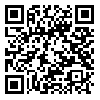Volume 16, Issue 4 (Oct 2022)
payavard 2022, 16(4): 362-372 |
Back to browse issues page
Ethics code: IR.TUMS.SPH.REC.1399.316
Download citation:
BibTeX | RIS | EndNote | Medlars | ProCite | Reference Manager | RefWorks
Send citation to:



BibTeX | RIS | EndNote | Medlars | ProCite | Reference Manager | RefWorks
Send citation to:
Mohammadzadeh N, Ebrahimi N, Agah Heris M. Design and Evaluation of Mobile Application to Control Overweight with Cognitive Behavioral Therapy Approach. payavard 2022; 16 (4) :362-372
URL: http://payavard.tums.ac.ir/article-1-7240-en.html
URL: http://payavard.tums.ac.ir/article-1-7240-en.html
1- Associate Professor, Department of Health Information Management, School of Allied Medical Sciences, Tehran University of Medical Sciences, Tehran, Iran
2- Master of Sciences Student in Health Information Technology, School of Allied Medical Sciences, Tehran University of Medical Sciences, Tehran, Iran ,negin.ehm95@gmail.com
3- Associate Professor, Department of Psychology, Payame Noor University, Tehran, Iran
2- Master of Sciences Student in Health Information Technology, School of Allied Medical Sciences, Tehran University of Medical Sciences, Tehran, Iran ,
3- Associate Professor, Department of Psychology, Payame Noor University, Tehran, Iran
Abstract: (1240 Views)
Background and Aim: According to the report of the World Health Organization, overweight and chronic and psychological diseases caused by it have reached an alarming level in the world. Today, cognitive behavioral therapy as a specific method for controlling overweight teaches the audience how to identify and change inappropriate behavior patterns and destructive thoughts with distress that negatively affect their behavior and emotions. The purpose of this research was to provide a mobile-based application for overweight control with a cognitive-behavioral therapy approach.
Materials and Methods: This research was of applied-developmental type. In the first stage, by examining the available applications based on mobile and related to weight control and also Beck cognitive therapy protocol for weight loss, the capabilities of the application were identified and then based on a survey of experts, these capabilities were determined. Afterwards, the user interface of the application was designed and the necessary coding was done to use it. The database was then created using MySQL software and the application program was created using Flutter software and Dart programming language and was named CBTdiet. Finally, the usability of the application was evaluated by users using a standard QUIS questionnaire.
Results: Based on the entry and exit criteria, among the 247 identified applications, the capabilities of 17 applications were examined. Finally, according to the opinion of the experts, 21 capabilities, including the ability to send motivational messages to the audience and the ability to reward to achieve weight loss of one kilogram per week, were considered for the design of the application program. The application designed in this research was at a good level from the users’ point of view with an average of 7.99±1.1 and was able to obtain an acceptable level of satisfaction in the evaluation stage. The software’s overall capabilities section got the highest average score (8.12) and the screen section got the lowest average score (7.89) among all sections.
Conclusion: Based on the determined capabilities, a mobile-based application for controlling overweight was designed and created with a cognitive behavioral therapy approach, and it can be effective in overweight control by modifying lifestyle and changing destructive thoughts.
Materials and Methods: This research was of applied-developmental type. In the first stage, by examining the available applications based on mobile and related to weight control and also Beck cognitive therapy protocol for weight loss, the capabilities of the application were identified and then based on a survey of experts, these capabilities were determined. Afterwards, the user interface of the application was designed and the necessary coding was done to use it. The database was then created using MySQL software and the application program was created using Flutter software and Dart programming language and was named CBTdiet. Finally, the usability of the application was evaluated by users using a standard QUIS questionnaire.
Results: Based on the entry and exit criteria, among the 247 identified applications, the capabilities of 17 applications were examined. Finally, according to the opinion of the experts, 21 capabilities, including the ability to send motivational messages to the audience and the ability to reward to achieve weight loss of one kilogram per week, were considered for the design of the application program. The application designed in this research was at a good level from the users’ point of view with an average of 7.99±1.1 and was able to obtain an acceptable level of satisfaction in the evaluation stage. The software’s overall capabilities section got the highest average score (8.12) and the screen section got the lowest average score (7.89) among all sections.
Conclusion: Based on the determined capabilities, a mobile-based application for controlling overweight was designed and created with a cognitive behavioral therapy approach, and it can be effective in overweight control by modifying lifestyle and changing destructive thoughts.
Send email to the article author
| Rights and permissions | |
 |
This work is licensed under a Creative Commons Attribution-NonCommercial 4.0 International License. |





